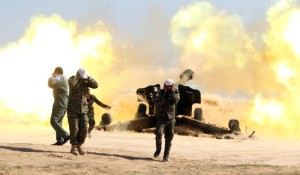US Assists Iraqi Government in Tikrit Offensive
Following two days of U.S. airstrikes, the Iraqi military is resuming the offensive to retake the city of Tikrit, which the Islamic State seized during its rapid advance across northern Iraq last summer. The U.S. ordered the airstrikes in response to Iraqi Prime Minister Haidar al-Abadi’s request for assistance, after a ground offensive by Iranian-backed militias stalled. U.S. coalition forces conducted 18 airstrikes against Islamic State fighters in Iraq, with eight of these strikes targeted near Tikrit, the U.S. military reported on Saturday. According to this statement, the strikes destroyed 11 Islamic State fighting positions, three tactical units, a vehicle, and a potential car bomb. Air strikes also struck additional targets near Fallujah, Mosul, Tal Afar, Ar Rutbah, and Bayji. “These strikes are intended to destroy [IS] with precision,” said U.S. Lieutenant-General James Terry.
Up until now, the United States had no involvement in the Tikrit offensive, which the Iraqi military and Iranian-backed Shiite militiamen launched earlier this month. The offensive is the largest in the country since the fall of Mosul to ISIS in June 2014. The forces initially succeeded, capturing surrounding towns and villages around the Tigris River and entering the northern and southern districts of the city. However, the advance has gained momentum over the past two weeks, with Iraqi forces suffering heavy casualties as a result of Islamic State bombings. Today, Islamic State militants remain firmly entrenched in the city center, prompting the call for U.S. airstrikes to create a critical breakthrough.
While the United States has made the most visible contribution to the fight against the Islamic State through its air campaign, Iran has assumed a major role on the ground, with military advisers led by General Qasem Soleimani, commander of the Revolutionary Guards’ Quds Force, helping to coordinate assaults. Iran has also provided the militias with training and weapons. The role of the Shia militias has sparked significant controversy due to accusations of sectarian abuses in some areas. American officials had previously warned of the danger of Shiite militia participation in deepening the country’s bloody sectarian divide and hindering long-term cooperation between Iraq’s Shiite-led government and the country’s Sunni minority.
The question of U.S. air support in the battle for Tikrit is a major point of contention between the Iraqi military and the Iranian-backed militias. Hadi al-Amiri, the head of the Badr Brigade militia, reportedly said, “We did not ask for [extra strikes] and we have no direct contact with the Americans. From what I understand, Prime Minister Haidar al-Abadi made the request. However, we respect his decision.” U.S. involvement in the renewed offensive included the stipulation that upwards of 20,000 Iran-backed Shiite militiamen be sidelined. These militias, which have protected Baghdad from the Islamic State’s advance since the summer, are forced to sit back as Iraqi military forces seize on the opportunity created by U.S. airstrikes. This development could strain the already precarious U.S.-Iran alignment of interests in Iraq. Pentagon spokesman Colonel Steve Warren noted that Baghdad’s decision to choose American aid over Iranian support in the Tikrit offensive marks a clear indication of the direction in which the overall military campaign is headed.
The battle for Tikrit is not likely to be a quick, easy operation. However, its successful execution will be a crucial step in the larger military campaign to reclaim the city of Mosul later this year.

